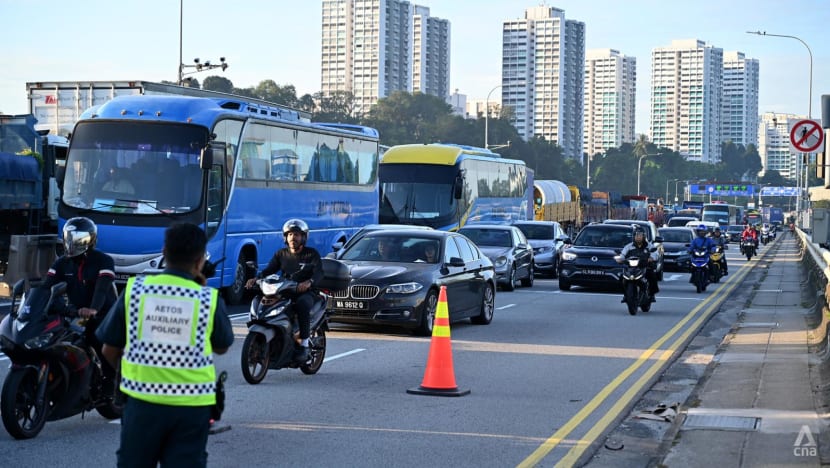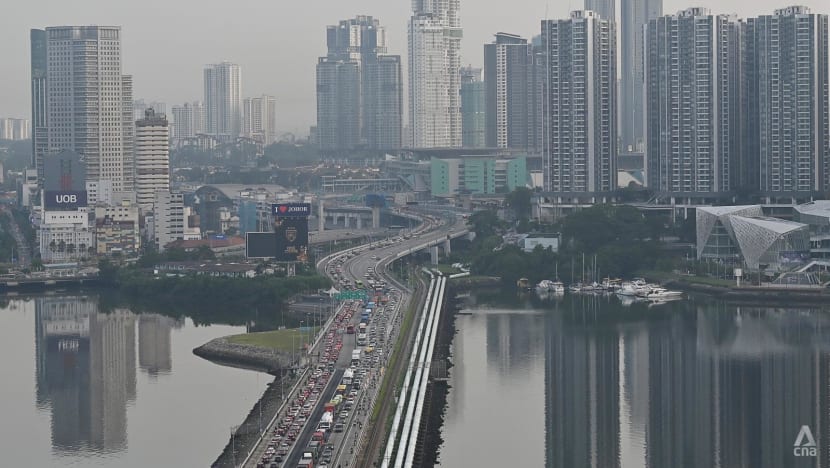Interest rising among firms seeking to enter Johor-Singapore SEZ ahead of deal signing
Singapore companies in the food manufacturing and logistics space said the special economic zone will help them save costs and access new markets.


This audio is generated by an AI tool.
SINGAPORE: Interest in the Johor-Singapore Special Economic Zone (SEZ) among businesses has grown by up to 25 per cent, ahead of a joint agreement to be signed on Tuesday (Jan 7).
Banking and legal consultants told CNA they have seen a jump in the number of firms seeking advice to enter the SEZ, which aims to boost cross-border economic connectivity between Singapore and Malaysia.
Companies are keeping a close watch on developments, especially as the 11th Malaysia-Singapore Leaders’ Retreat in Putrajaya - where the signing of the deal is set to take place - was postponed from last month.
A memorandum of understanding was inked in January last year between both countries to develop a framework for a legally binding agreement on the SEZ.
SAVING ON COSTS
Companies in the food manufacturing and logistics industries said they hope to save costs and access new markets through the zone.
Some of the initiatives previously mooted include tax and regulatory incentives, which will make it easier for businesses to either expand into Malaysia or build their existing presence there.
In anticipation of these firms’ needs, OCBC has set up dedicated teams on both sides to develop their business and connect them with suitable partners.
Strong interest has emerged among mid-sized manufacturing and logistics firms looking to utilise land in Johor, said Mr Julian Chua, executive director of the enterprise banking international department at OCBC’s global commercial banking division.
He said the bank has also seen many foreign-owned firms, predominantly those from China, seeking to enter the SEZ.
“The Chinese have always been coming to ASEAN (Association of Southeast Asian Nations), especially to Singapore as a financial hub, to use it as a stepping stone. In this case, given Johor is our neighbour, they are looking to see what more they can do in this special economic zone,” added Mr Chua.
Players in Singapore’s food and beverage space will also look at how to benefit from the SEZ when travel on both ends of the Causeway becomes more seamless, he said.
The Johor Bahru-Singapore Rapid Transit System (RTS) Link is set to begin operations by the end of next year.
EXPAND REGIONAL PRESENCE
One such F&B player, South Korean bakery Paris Baguette, said it hopes to tap the SEZ to boost its market presence in the region.
It makes frozen versions of its pastries in Johor and aims to further reach out to the Muslim market.
The company currently occupies 16,000sqm of land in Johor for its manufacturing facility, its first and only halal-certified factory. It has also acquired another 24,000sqm of land adjacent to this factory for further expansion.
“One of the things that we also hope to see is a more standardised regulatory compliance checklist, maybe for the businesses operating within the SEZ zone,” said Ms Hana Lee, CEO of Paris Baguette SEA.
“Maybe that will also help us to simplify some ongoing operations and allow us to focus on our growth, rather than all these more complex processes.”
When the company chose to set up a manufacturing facility in Johor, it considered the greater ease in hiring talent and operating at a lower cost compared with Singapore, Ms Lee noted.
Mr Chua also pointed out that the costs of labour and rent in Singapore are “a little bit higher” compared with Malaysia.
“(For) a lot of companies, when they plan and if their business model permits them to operate in Malaysia and use Malaysia as another country where they can expand their business - they will definitely have cost savings, because some of the products and things that they do will … come back to Singapore and benefit Singapore as well,” he added.
TIME NEEDED TO ADJUST REGULATIONS
Nevertheless, lawyers warned that even with the potential perks, it may take time for both sides to adjust regulations for businesses.
“We know that Singapore and Malaysia … have different tax rates. So Malaysia, I believe, now is 24 per cent. Singapore is 17 per cent, so obviously the cost of doing business and the tax on profits is going to be different,” said Mr Chia Kim Huat, regional head of Rajah & Tann Singapore’s corporate and transactional group.
“There will be some measures that we need, I think, to harmonise that. But as we do that, we also must be mindful that Malaysia is a large country, and Johor is just one of many states in Malaysia.”

Given that Malaysia shares a land border with Thailand as well, Mr Chia said states bordering Thailand will want similar preferential treatment.
He also noted that parts of a finished product could be manufactured in Johor and Singapore before it is exported out of the region.
Because of this, differing standards and requirements between Singapore and Malaysia will have to be streamlined over time to ensure an integrated supply chain.
WILL POLITICS GET IN THE WAY?
Mr Lim Chong Kin, managing director of corporate and finance at Drew & Napier, cautioned that while the SEZ will likely bring about significant benefits, a key question is how long this can be sustained without politics eventually getting in the way.
“In this regard, businesses in Singapore that want to relocate to Malaysia must be clearly attuned not just to the usual business considerations of cost, but also sensitive to the ever-shifting undercurrents between both nations,” he said.
The lawyer said he always advises clients to have an exit strategy if they are thinking of relocating their businesses to Johor in a significant way.
He pointed to how the Kuala Lumpur-Singapore high speed rail was scrapped after former Malaysian prime minister Najib Razak’s government fell from power in 2018.
Mr Lim said sentiments in Malaysia then “quickly turned against” closer economic cooperation with Singapore.
For the current proposed SEZ, the Sultan of Johor had ascended Malaysia’s rotating throne in January last year and sought Prime Minister Anwar Ibrahim’s cooperation to develop Johor, Mr Lim noted.
“One cannot underestimate the political undercurrents in Malaysia that can quickly sour existing economic cooperation between the two nations,” he added.
If the SEZ does prove successful, Mr Chia said it could be replicated in other states in time to come.
“It is hopeful that with the setup of the Special Economic Zone, we could also attract more foreign companies - including the Chinese companies, the Japanese companies, the Korean companies - to relocate part of their facility to this region so that we can have a more stable, diversified and efficient supply chain,” he added.
“That, of course, will work well for our communication sectors, for our ports, for aviation, as well as for people who are providing services to these new businesses.”





















